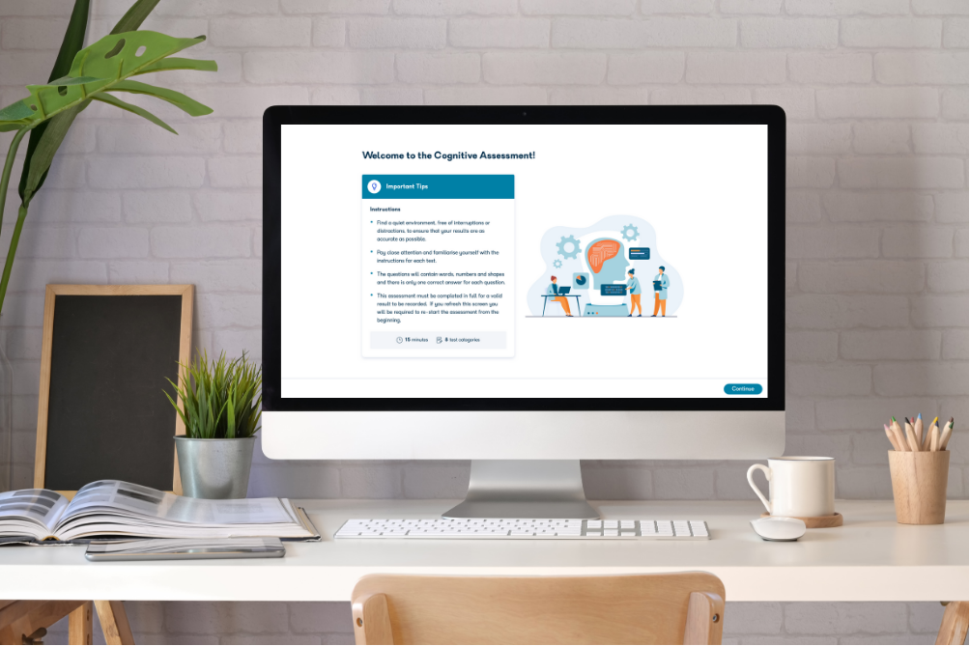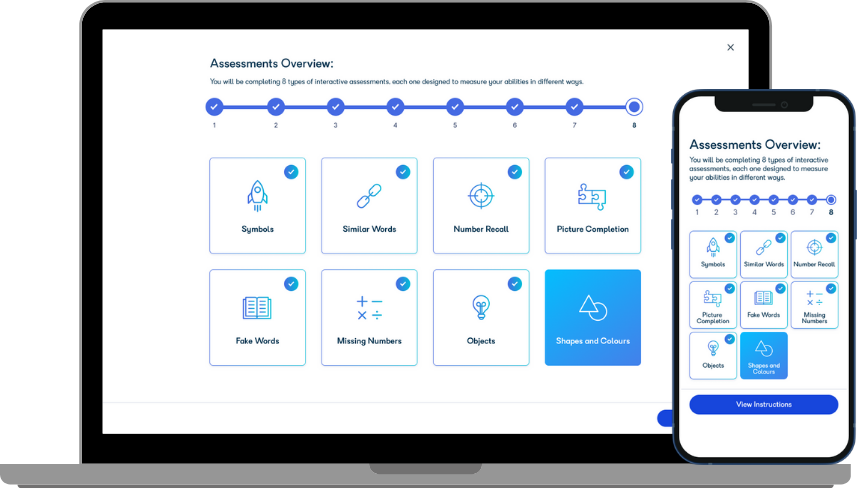According to the Department of Education, around 13.5% of apprentices report learning difficulties or disabilities (LDD). However, research suggests this figure underrepresents the real number. As many as 20% of adult learners may have non-statemented learning needs that could affect their success in a learning programme.[1] This is why the funding rules require training providers to screen learners undertaking vocational training programmes for learning support needs, as part of the initial assessment.
Why assessment matters
Screening for additional cognitive needs is particularly important in vocational training because success isn’t simply a case of gaining knowledge, but also on supporting the cognitive processes that underpin how people learn, adapt, and grow. With this understanding comes a greater awareness of the need to tailor support to each learner’s unique needs, and that starts with an effective initial screening.
Some learners may be hesitant to declare their needs because they mistakenly believe it may prevent them from starting a programme like an apprenticeship. Others may simply be unaware that they have a need that can be supported. That’s why it’s so important for providers to screen all learners during the onboarding process, but this can be prohibitive in terms of cost and time chasing up the assessments. Traditional assessments can feel like hurdles instead of stepping stones. They’re time-consuming, anxiety-inducing, and, worst of all, disengaging—especially for younger learners or those with a history of struggling in education.
Engagement should be the first priority in cognitive assessment
As well as causing onboarding delays as administrators chase up uncompleted assessments, the engagement of learners is essential for accurate screening. The moment a learner disengages, the value of the assessment plummets. Here’s why keeping learners engaged is critical:
1. Increases Accuracy
An engaged learner is more likely to take the task seriously. They process the questions carefully, answer thoughtfully, and give it their full attention. This results in a truer picture of their cognitive strengths and challenges. In contrast, a disengaged learner might rush through the test, click at random, or skip it entirely.
2. Reduces anxiety and stigma
When a screening tool is gamified, mobile-friendly, and quick, it feels less like a test and more like an exploration. It removes the formal test anxiety that often triggers past negative experiences. And it helps learners realise that this is not about passing or failing—it’s about getting the right support to thrive.
3. Promotes self-awareness
A well-designed interactive assessment encourages moments of insight. Learners begin to recognise their strengths. For example, a learner may excel at visual memory tests but need help with verbal reasoning. That kind of awareness builds confidence and can support them in becoming advocates for their own learning journey.
4. Boosts completion rates
The simple trust is that engaging assessments are more likely to be completed. Boring or overly complex tests are costly and often abandoned midway, leaving providers with incomplete data and learners without the support they need.

Aptem Assess – designed for engagement
Initial needs screening tool Aptem Assess was developed from the ground up by Chartered Psychologists. It follows the best practice guidelines laid out by the British Psychological Society, the International Test Commission, and the European Federation of Psychologists. But what really makes it stand out is the design philosophy behind it: engagement first, always.
- Eight gamified tests that feel more like puzzles than exams. These include tasks like symbol spotting, identifying missing picture pieces, and recognising fake words. Each one targets a core cognitive skill, such as working memory, verbal reasoning, or executive function.
- Smart adaptability ensures learners don’t get stuck in too-easy or too-hard questions. The test adjusts in real time, keeping the experience flowing and frustration-free.
- Mobile-first design allows apprentices to complete assessments on the device they’re most comfortable with—whether that’s a phone, tablet, or desktop.
- Quick and simple to complete, with approximately 87% of learners completing the assessment in 15 minutes or less.
- Clear, friendly interface that removes distractions and makes navigation intuitive.
In addition to these features, a quality score flags careless or disengaged responses, helping providers know when to revisit an assessment or explore further.
Each of the eight games in Aptem Assess maps to a specific cognitive skill that’s key to learning success:
- Symbols – Tests visual processing speed. Ideal for identifying learners who may struggle with absorbing new information quickly.
- Similar Words – Evaluates verbal reasoning. Key for understanding instructions and written content.
- Number Recall – Measures working memory span. Low scores here can impact problem-solving and multi-step tasks.
- Picture Completion – Assesses visual-spatial reasoning, critical for trades and technical apprenticeships.
- Fake Words – Challenges word recognition, especially useful for spotting signs of dyslexia.
- Missing Numbers – Basic arithmetic ability using all four operations, shedding light on numeracy challenges.
- Objects – Short-term memory assessment using visual recall.
- Shapes and Colours – Executive functioning test, based on the well-known Stroop effect. Crucial for focus and task-switching.
This multifaceted approach helps training providers build a comprehensive picture of each learner’s needs. As Leanne Hughes, Operations Manager at Time2Train stated following the pilot programme, “We loved the Aptem Assess assessment from the minute we first saw it and think it’s particularly engaging for our non-technical apprentices.” Rosie Tasker-Brown, Senior Functional Skills Maths Tutor at Specialist Skills Hub added that the team was “impressed by its engaging design, efficient completion time, and accessibility across all devices.”
Better engagement delivers greater inclusion
An engaging assessment is an inclusive assessment. When cognitive screening is enjoyable, learners with undiagnosed needs are more likely to participate fully. Those with past anxieties around education feel safer. And those without additional needs still benefit from a quick, non-disruptive process that doesn’t delay their onboarding. Kelly McAllister, Head of Apprenticeships at Bradford College commented, “Aptem Assess enables us to tailor our support and gives tutors a clear picture of each student’s needs, which leads to much better outcomes.” That’s why an engaging assessment isn’t simply a nice-to-have – it’s essential.
Discover the difference – try Aptem Assess free
When learners feel seen, supported, and understood, they’re ready to succeed. At Aptem, we believe in giving learners the best start possible. That’s why we created Aptem Assess – a fast, intuitive, research-backed cognitive screening tool that actively engages learners. Try Aptem Assess for free and experience firsthand how engaging, accessible cognitive assessment can transform your learner onboarding process—and help you meet mandatory requirements with confidence. Visit the website to learn more and to try the test for free today.

[1] McLoughlin, D., & Doyle, N. (2017). “Psychological assessment of adults with specific performance difficulties at work”. The British Psychological Society. https://www.bps.org.uk/guideline/psychological-assessment-adults-specificperformance-difficulties-work.















Your thoughts